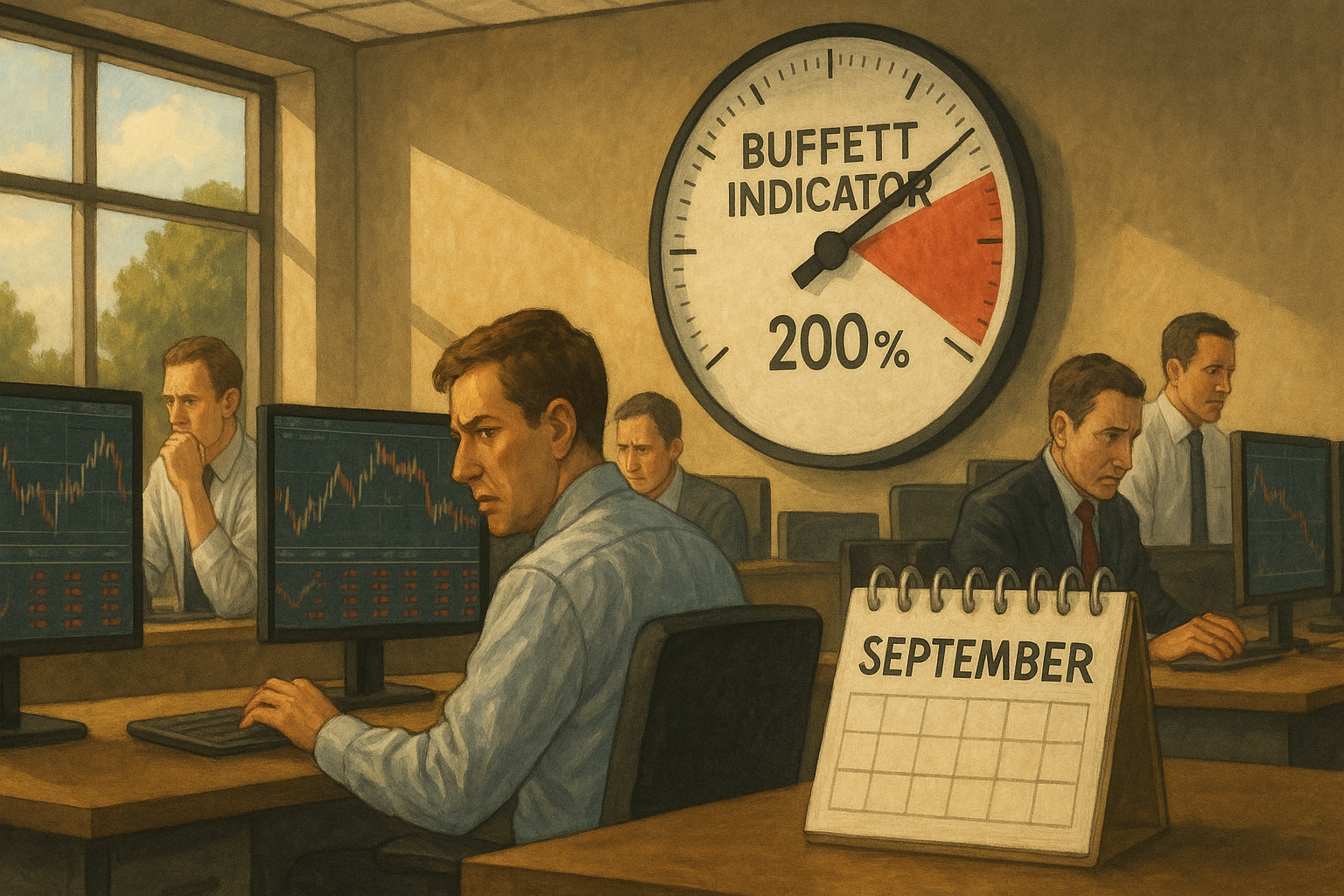September is here, folks – that notoriously tricky month that has Wall Street veterans chewing their fingernails and checking their portfolios with one eye closed. It's the time when summer-tanned traders reluctantly return from their Hamptons hideaways to face reality, while the rest of us wonder whether we should be obsessively refreshing our 401(k) apps or practicing the fine art of financial ignorance.
I've been covering market cycles since before "meme stocks" were even a glimmer in Reddit's eye, and September never fails to generate anxiety. Will we see a correction? A rally? A full-blown crash? Or just a whole lot of nothing?
Let's dig in.
The Buffett Indicator Is Screaming
First things first – we need to talk about the Buffett Indicator. It's topped 200, people. Two. Hundred.
For those who missed that day in Investing 101, this metric (one of Warren Buffett's personal favorites) compares total U.S. stock market capitalization to GDP. Historically, readings above 120 suggest the market's getting frothy. At 200+, we're not just in expensive territory; we're in what-the-hell-is-happening land.
But here's the thing about valuation metrics – they're terrible timing tools. Terrible! The Buffett Indicator has been flashing warnings for years now. It's like that "Service Engine Soon" light in your car that you've successfully ignored through three presidential administrations.
Correction Territory? Maybe.
There's certainly no shortage of reasons why markets might pull back:
The Fed's still keeping money relatively tight, despite some dovish head-fakes recently. I spoke with three economists last week who all used the same phrase: "higher for longer." Not exactly inspiring stuff.
Consumer spending data is showing cracks. Have you seen the credit card delinquency numbers? Yikes.
Inflation's being stubborn – like that house guest who keeps finding reasons not to leave.
Look, a 10-15% pullback wouldn't just be normal; it would be downright healthy. Markets that never correct are like kids who never hear "no" – they develop problematic behaviors that eventually lead to bigger meltdowns.
The Boring Possibility
Then again... nothing might happen. Seriously.
Markets can absolutely meander sideways for weeks, which makes for excruciatingly dull financial television but isn't actually unusual. ("Day 14 of market movement under 0.2%. We'll be right back after these messages for antacids and retirement planning services.")
A flat September would suggest investors are collectively taking a breather, reassessing those sky-high valuations, and waiting to see what Q3 earnings season brings in October. It's the market equivalent of unbuttoning your pants after Thanksgiving dinner.
Melt-Up Madness?
Never count out irrational exuberance. Having covered three major bubbles in my career, I can tell you that markets have an incredible capacity to get even more expensive when they're already expensive.
A melt-up scenario might be triggered by:
- Surprisingly strong economic data (which, let's be honest, nobody's really expecting)
- The Fed signaling rate cuts are coming sooner than expected
- Institutional FOMO – because yes, even professional money managers suffer from fear of missing out
- Retail traders deciding that missing more upside is scarier than risking downside
The problem with melt-ups? They eventually melt down. They're financial sugar rushes – feel great in the moment, crash hard later.
A Sensible Rally
A more measured upward move – let's say 3-5% – could happen if:
Inflation numbers come in cooler than expected (please, please, please) Corporate earnings hold up despite all the recession chatter The job market stays resilient without overheating
This would be the "Goldilocks" scenario that Wall Street loves to talk about – not too hot, not too cold. Just right.
The Crash Scenario (Gulp)
And then there's... the big one. The scenario that generates the most clicks and the most acid reflux: a genuine market crash.
What might trigger a 20%+ decline? Perhaps a geopolitical shock we haven't priced in yet. Or a major financial institution hitting the skids. Or simply the collective realization that – wait a minute – paying 30x earnings while interest rates are at multi-year highs doesn't actually make mathematical sense.
But here's my honest assessment, after covering market downturns for two decades: genuine crashes rarely come when everyone's looking for them. They tend to sneak up when complacency is highest. Are we complacent now? Not exactly – there's plenty of worry to go around.
My Two Cents (Inflation-Adjusted)
If I were forced to place a bet – and isn't that what these predictions really are? – I'd lean toward a modest correction. The market has priced in so much good news, tech valuations assume flawless execution of AI strategies, and September has that annoying historical tendency to disappoint.
That said, I've been expecting a pullback since... well, approximately forever. So my timing track record isn't exactly sterling.
What matters more than September's gyrations is how you've positioned yourself for the long haul. The Buffett Indicator may be screaming about overvaluation, but Buffett himself still holds billions in equities. Why? Because he's playing a decades-long game, not a monthly one.
So what's September got in store? Honestly, I have no idea. But whatever happens, I guarantee we'll all have perfectly rational explanations for it after the fact. That's the beauty of finance – hindsight makes geniuses of us all.
What do you think September will bring? Drop your predictions below – I'm genuinely curious to see what the collective wisdom (or collective delusion) suggests is coming next.
